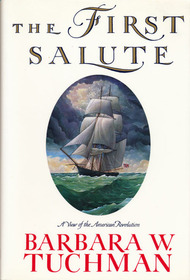Search -
The First Salute: A View of the American Revolution
The First Salute A View of the American Revolution
Author:
On November 16, 1776, a ship flying the red-and-white-striped flag of the Continental Congress entered the port of St. Eustatius in the West Indies. Adhering to custom on entering a foreign port, the ship fired a salute, and the guns of the island's fort returned a ritual response. The act of recognition acknowledged that the vessel and its ... more »
Author:
On November 16, 1776, a ship flying the red-and-white-striped flag of the Continental Congress entered the port of St. Eustatius in the West Indies. Adhering to custom on entering a foreign port, the ship fired a salute, and the guns of the island's fort returned a ritual response. The act of recognition acknowledged that the vessel and its ... more »
ISBN-13: 9780394553337
ISBN-10: 0394553330
Publication Date: 9/12/1988
Pages: 347
Rating: 13
ISBN-10: 0394553330
Publication Date: 9/12/1988
Pages: 347
Rating: 13
3.6 stars, based on 13 ratings
Publisher: Alfred A. Knopf
Book Type: Hardcover
Other Versions: Paperback
Reviews: Amazon | Write a Review
Book Type: Hardcover
Other Versions: Paperback
Reviews: Amazon | Write a Review
Genres:
- History >> Americas >> United States >> Revolution & Founding >> General





